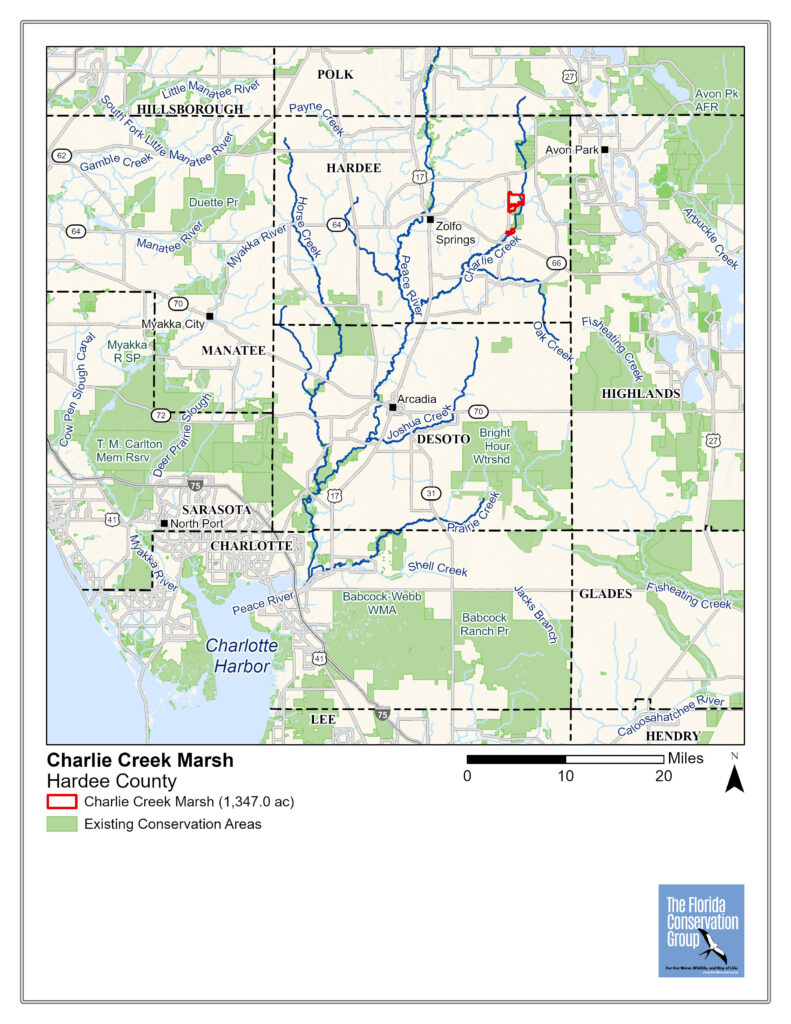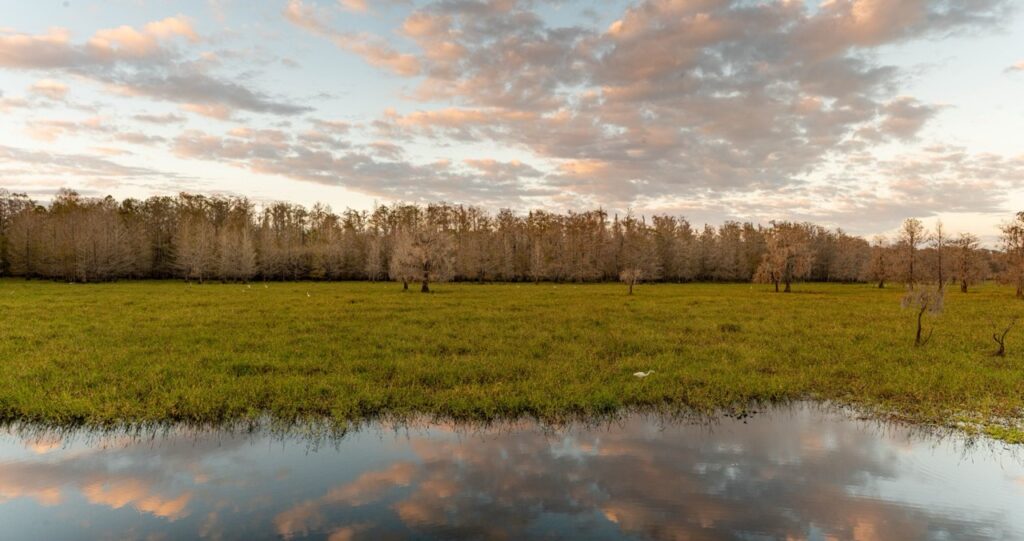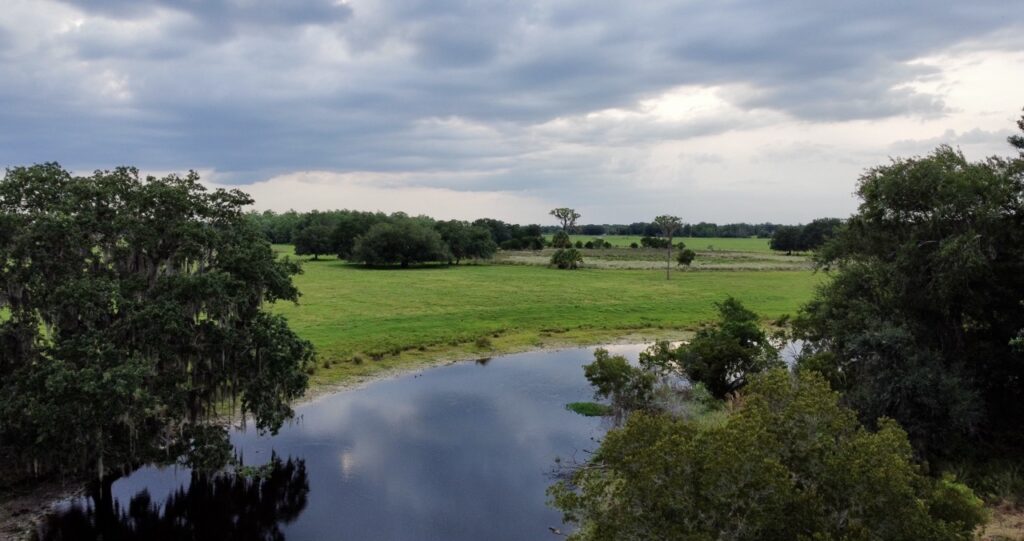Spotlight: Ned Hancock
Ned Hancock’s career is steeped in Florida’s citrus industry and a lineage of ranchers dating back to the state’s open cattle range days of the 1800s. All the lands operated by members of Hancock’s family trace back to a common ancestor, and both his grandparents and father ran citrus groves. Given his family’s longtime commitment to farming and ranching, he has developed a deep appreciation for the state’s agricultural lands and their future.
In rural Hardee County, where Hancock and his family grow oranges and raise cattle along Charlie Creek, the landscape is rapidly changing. Burgeoning suburban development from the growing city of Sebring is encroaching into the wet prairies and grasslands. The lands are dominated by the influence of Charlie Creek, where pastures give way to hammocks containing mature hardwoods and cypress, and then to the large marshes and shrub wetlands in the creek floodplain. It is beautiful, verdant Florida terrain.
Agricultural lands hold particular significance within Florida’s Peace River Valley region, renowned for its fertile soils and favorable citrus and livestock farming climate. Situated in Zolfo Springs, Hancock’s acreage encompasses both his cow-calf operation and citrus groves. This area has historically been a hub for agricultural activities, benefiting from the nutrient-rich soils and proximity to the Peace River, which provides essential water resources for the region.
But Hancock is one of many agricultural landowners who are feeling the squeeze of development pressure. Subdivisions and sprawling “ranchettes” are fragmenting the once-vast working lands, and driving many growers away.
That burden to maintain an agricultural landscape and rural economy in the region weighs heavily on Hancock. He and other farmers and ranchers have decided to start conserving their lands through the state’s Rural and Family Lands Protection Program, which will buy their development rights, but leave their groves and ranches to them.
Because the state is home to a diverse geography and a stunning array of natural resources, Florida continues to serve as a national leader in land protection efforts. At the state level, programs such as the Rural and Family Lands Protection Program (RFLPP) exist to provide landowners with assistance in preserving agricultural lands across Florida.
The Rural and Family Lands Protection Program is characterized by its commitment to protect our working lands, food grown in Florida, our agricultural economy, and our rural way of life. This agricultural conservation easement program is administered by the Florida Department of Agriculture and Consumer Services (FDACS) under Commissioner Wilton Simpson, and it is key to the continued success of Florida’s agricultural industry.
Hancock and his neighboring family members have collectively enrolled around 2,600 acres in the RFLPP. He appreciates the state’s efforts to conserve agriculture and open space. “The RFLPP encourages you to be the best agricultural producer you can be,” Hancock said. “From an economic standpoint, I think that’s what the program is all about.”
Hancock and his neighboring family members submitted the Charlie Creek Marsh RFLPP Project; these lands border Charlie Creek, and are predominantly native habitat that provides a haven for diverse wildlife, including Osceola turkeys and the Florida panther. Charlie Creek is one of the most significant tributaries to the Peace River, which supplies drinking water to over a million people downstream before it flows into Charlotte Harbor,
Hancock’s participation in conservation programs exemplifies his commitment to sustainable land stewardship. His efforts underscore the importance of balancing economic interests with environmental conservation, ensuring that Florida’s Peace River Valley continues to thrive as a cornerstone of the state’s agricultural heritage.
The Peace River Valley is critical to the economic and environmental vitality throughout the state, but particularly in southwest Florida where it supplies and filters drinking water, and stores flood waters that impact communities downstream. Its impact to the health of the Charlotte Harbor Estuary, an Estuary of National Significance, cannot be overstated. Located in Hardee, DeSoto, and portions of Polk and Charlotte counties, the Peace River Valley is a rapidly changing region that has been underrepresented by conservation action, yet is critical to Florida’s agricultural industry.
“I believe it will change the makeup of our state, both economically and ecologically, if we don’t start really working to preserve some of this,” Hancock said. “I truly think that the long-term survival of Florida is going to be dependent upon these swaths of land remaining in agriculture or non-development.”
In the face of increasing pressures from urban expansion and infrastructure projects, the preservation of agricultural lands in the Peace River Valley is paramount. “I don’t recall an area as traditionally agricultural as ours ever facing pressure for development comparable to the level I’m now seeing,” notes Hancock.
A conservation easement like those in the RFLPP is a voluntary, legal agreement between a government agency and a landowner that permanently limits the uses of the land in order to protect its conservation values. The land remains privately owned, supporting the economy, providing local jobs, and contributing tax revenue for essential services. Land management and all agricultural production remains the responsibility of landowners. Agricultural easements cost the state a fraction of outright land purchases and are an investment in Florida’s agriculture industry.
These agreements enable Hancock and his neighbors to protect their property from being developed for non-agricultural use, thereby safeguarding the integrity of this vital agricultural landscape for future generations. Preservation efforts reach beyond the land itself and “benefit the state, benefit the local community, and maintain agricultural production that’s been the backbone of our economy and entire way of life,” Hancock said.
By collaborating with local ranchers and landowners, the Florida Conservation Group is dedicated to safeguarding the ecological health and preserving agricultural land of the Peace River Valley region.
Photos by Andrew Joughin.



